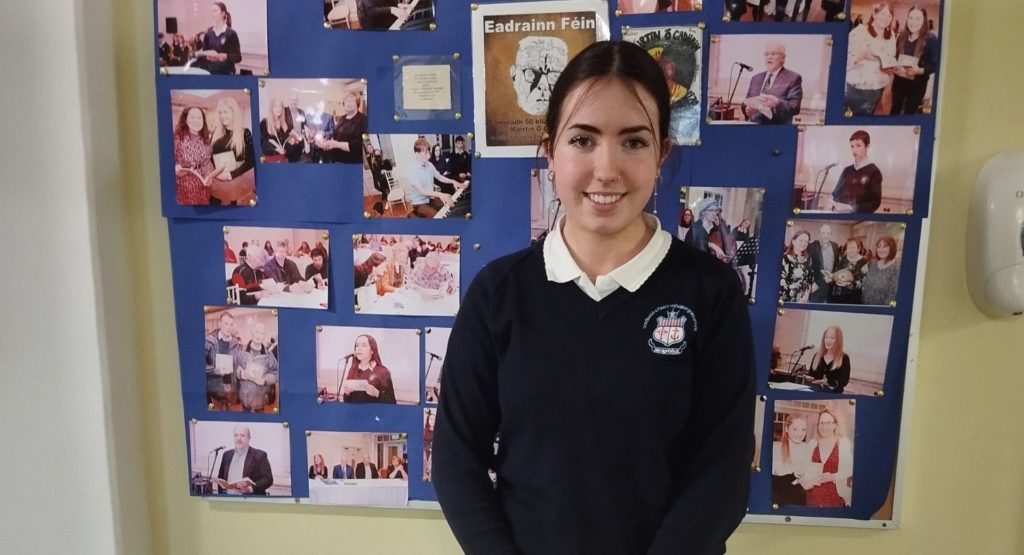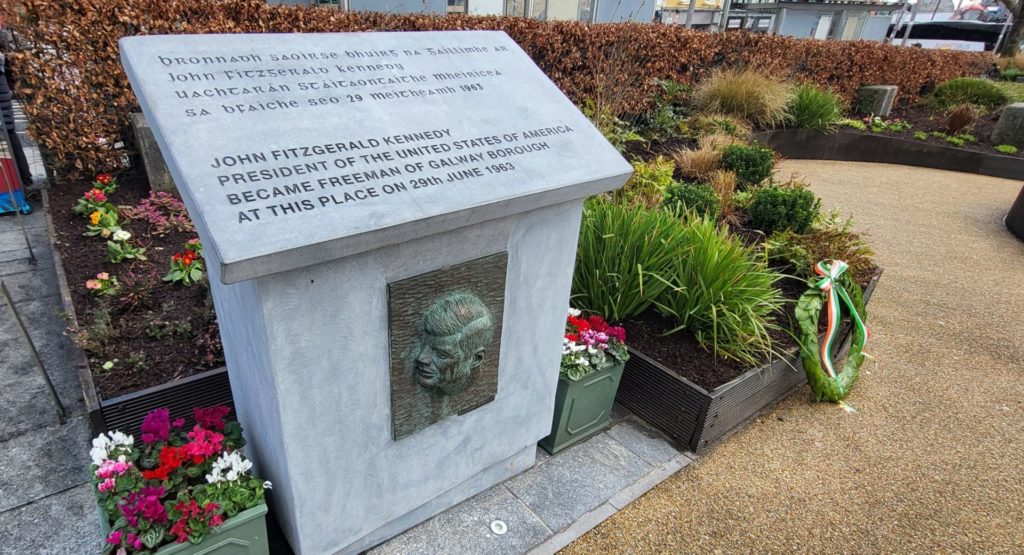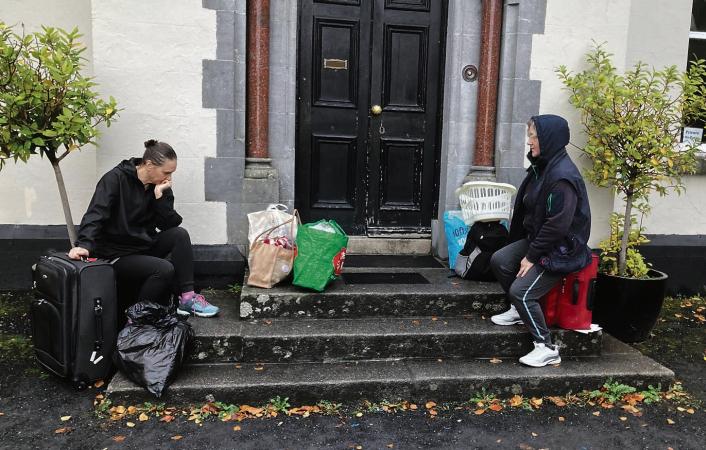-
-
Author: Our Reporter
~ 6 minutes read
By Elizabeth Garner and Jim Hynes
A small South Galway community demonstrated the strength of people power when they successfully intervened last week to prevent the state from relocating a group of 18 Ukrainians who had made their village their home from home.
Having fled their homes in the wake of Russia’s invasion of their homeland, the Ukrainians faced the prospect of being uprooted again, this time from their adopted Woodford homes of two years, with just 48 hours’ notice.
The refugees were already making a positive contribution to the area, with their children in the village school and many of the adults working.
Prior to their arrival, the local primary school had been at risk of losing a teacher and the newcomers were a welcome boost to a village with around 300 residents.
The notification to move residents to Connemara hotels – and leave a prominent Woodford heritage building permanently out of use – came despite Government plans to release tourist beds back into the market and focus instead on private accommodation.
Twenty adults and thirteen children have been living happily at Woodford’s Barkhill House, since the Russian invasion of their homeland in 2022.
But notice of closure was given in September, just as the children returned to school.
To date, neither the contracted provider or the proprietor of the building has been advised why the centre was closing and evicting its residents.
The Ukrainians were distraught when they were informed of the initial plan in September and in response Woodford residents hastily organised a meeting with Minister of State and local TD Anne Rabbitte.
Minister Rabbitte stressed that there was no health and safety issue with the building and assured the residents that she had received no complaints from within the centre or the local community.
She said she would take the case to Roderick O’Gorman, the Minister with responsibility for both children and integration.
Understanding the seriousness of the situation and the Ukrainians’ desire to stay, various community groups came together and prepared their own proposal for the Minister.
This entailed renovating local housing stock to make it habitable, thus taking the Ukrainians out of the state accommodation system for good, allowing them to put down more permanent roots.
But building renovation takes time, so a request was made to pause the evictions until the end of the school year to minimise disruption for the children.
This proposal, along with numerous letters from local community groups and schools was presented to Minister Rabbitte at a further community meeting the next day.
“This should not be happening in what is supposed to be a caring and civilised society,” the Board of Management of St. Joseph’s National School wrote in a statement.
“It benefits neither the families nor the school community… rather it belittles and denigrates everything this school – both management and staff – and indeed this community has done to welcome these families, ensure they have felt safe and protected and that their children were free to continue their education without disruption.”
Such feelings were echoed by the St. Joseph’s National School Parents Association.
“Our Ukrainian children are cherished members of our school community,” they wrote in a letter to Minister O’Gorman.
“They are our children’s friends, and their names are spoken fondly around the dinner table… Our children’s lives are richer because of these friendships.”
In a promising turn, Deputy Rabbitte informed the community that she had successfully negotiated a pause in the evictions, allowing the families to remain until the end of the school year.
As pledged in their proposal the community would prepare housing stock for them with a clear due date of June.
The community, the school and the Ukrainians breathed a sigh of relief – but just two weeks later on October 1, Ukrainian residents were informed that the evictions would proceed with only 48 hours’ notice.
As one Ukrainian resident put it: “I have to give up my home or give up my job”.
Following this, community support surged again.
An emergency meeting was called, with representatives from both the Ukrainian community and local residents appealing for a stay of execution.
The call to action took the form of countless letters, urgent emails and phone calls reaching out to anyone with the power to enact change. The more resistance that was met, the more the community confirmed their commitment.
In a last-minute communication scramble, just hours before the scheduled eviction, reassurances were shared that the Ukrainian residents would now be given a choice between relocating to the local centre in town or Connemara.
Having been let down once already, locals were sceptical – even more so when buses arrived the following morning informing locals they were taking residents to Clifden.
There seemed to have been a complete communication breakdown within the department; the bus should have transferred residents from Barkhill House to the local centre. In the end, locals helped move the Ukrainians to their new accommodation.
The community may take pride in successfully preventing a mass relocation from their area, but the reality remains that the eviction still transpired.
Scenes of crying Ukrainians packing their belongings will not soon be forgotten and the actions of the government have severely damaged the trust of the local community.
While the community understands the fiscal constraints on the government, the proposal to relocate people to locally renovated housing stock would have the removed the cost of housing from the state entirely.
The Woodford upheaval raises significant concerns about the management and communication strategies employed by the authorities involved in the provision of accommodation.
The proprietor’s generous offer to assume the contract at cost—designed to provide residents with essential time to secure alternative housing—was met with silence from decision-makers, highlighting a troubling lack of transparency in the process.
This disregard for rational discussion became even more pronounced when a second State Accommodation Centre with excess capacity was identified in the village.
As local Fine Gael TD Ciaran Cannon wrote to the community WhatsApp group “If they’re [the department] presented with a credible alternative, one that is already approved by them and they don’t avail of it, then they lose all credibility.”
Pictured: Hanna and Borys Lykhostierst – grandparents of young pianist argret Pokydailo – waiting to be collected from Barkhill where they have spent the last two years.
For more, read this week’s Connacht Tribune:
Connacht Tribune Digital Edition App
Download the Connacht Tribune Digital Edition App to access to Galway’s best-selling newspaper. Click HERE to download it for iPhone and iPad from Apple’s App Store, or HERE to get the Android Version from Google Play.
Or purchase the Digital Edition for PC, Mac or Laptop from Pagesuite HERE.
Get the Connacht Tribune Live app
The Connacht Tribune Live app is the home of everything that is happening in Galway City and county. It’s completely FREE and features all the latest news, sport and information on what’s on in your area. Click HERE to download it for iPhone and iPad from Apple’s App Store, or HERE to get the Android Version from Google Play.
More like this:

Witnesses sought to traffic incident at Clybaun Pedestrian Crossing
This article first appeared on Galway Bay FMThe Gardaí are seeking witnesses to a traffic inciden...

Plans for luxury sauna at Blackrock in Salthill
This article first appeared on Galway Bay FMPlanning permission is being sought for a luxury saun...

Pete Roche questions Agriculture Minister on farm buildings devastated by Storm Eowyn
This article first appeared on Galway Bay FMGalway East TD Pete Roche has questioned the Agricult...

Spiddal student named Irish winner of EU translation competition
This article first appeared on Galway Bay FMA Spiddal student has been named the Irish winner of ...

Galway marks US Presidential Day with wreath laying in Eyre Square honouring JFK
This article first appeared on Galway Bay FMGalway has marked US Presidental Day today with the l...

Catherine Connolly clashes with Tanaiste Simon Harris over Ireland's support for Palestine
This article first appeared on Galway Bay FMGalway West TD Catherine Connolly and Tanaiste Simon ...

UG Professor and Turloughmore GP wins Health Research Board Impact Award
This article first appeared on Galway Bay FMUniversity of Galway Professor and Turloughmore GP An...

10% increase in funding for Galway roads this year
This article first appeared on Galway Bay FMGovernment has announced an increase of 10 percent in...

Meeting hears Sceirde Rocks Offshore Windfarm would 'alter Connemara's skyline forever'
This article first appeared on Galway Bay FMA meeting at County Hall has heard that the Sceirde R...
Sign Up To get Weekly Sports UPDATES




